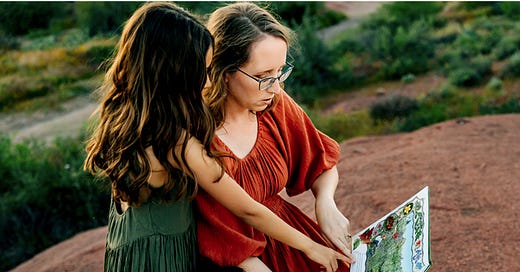There are no vocabulary lessons for 2 years olds.
Indeed formal vocabulary training doesn’t begin until children are 6 or 7. Despite no formal training, 5 year olds will have learned 2,500-3,000 words. A pretty impressive feat given that they had no lessons.
Kids have an incredible, natural ability to absorb language. However, the most common method we use to teach vocabulary, (writing word definitions) ignores this ability and arguably works against it.
There are two types of vocabulary: passive and active. Passive vocabulary is when a child understands a word from context but doesn’t yet use it. Studies show that understanding just 90% of a sentence is enough to figure out almost any unfamiliar word. Like reading, children can understand stories many grade levels above their reading level long before they can read them independently.
Active vocabulary, however, is what we truly want—where kids use words confidently from memory.
Studies show by far the most effective way to transition to active vocabulary is practicing new words in context.
Most children will do this completely on their own!
As children’s language skills grow, children will take on more and more words - without a formal vocabulary program. But.. and this is a big but… they can only do this if they are exposed to exceptional words often and frequently. So, how do you harness children’s innate neurobiological ability for language acquistion while also ensuring vocabulary growth?
3 Natural Strategies to a Rich Vocabulary
1. Read high quality literature
This one is always a winner friends! I’ve read to my children since birth. I’ve focused on classics, those with sweet, delicious language. Beatrix Potter books are incredibly rich in vocabulary, so much so one wonders how toddlers can even understand them. But we sell our children short far too often. Kids pick up the cadence and language associated with these books just like they do when you talk to them as infants. Speaking of talking to your children…
2. Talk UP to your children
Never talk down to your children, talk to them with your full vocabulary. Don’t hide words you think they won’t know. I often use words that receive a confused look, so I’ll use several synonyms that are too complex before arriving at a word they would understand. As it turns out, I’m not terribly good at coming up with definitions but synonyms seem to work just as well! If you aren’t a definition wiz either, it’s never been easier to ask a Siri, Alexa, or chatGPT. What’s most important is that you don’t talk down to your children. Speak to them as you would a colleague or another adult (age-appropriate topics of course).
3. Create a vocabulary-rich environment
If you want your children to “try” out new words, you must create an environment where the use of big words, even ones they are just trying out, is encouraged. My kids will often insert a big word they’ve heard into their writing or speech. It appears just like play - the best way to learn of course.
Earlier today, my 10 year wrote: “Above the clouds, a call issued down to Earth’s brilliant blue waters”.
I wasn’t even sure you could use issue in this context - turns out you can. The use of complex words in new situations is KEY to developing a strong vocabulary. She’s showing me that she has transitioned “issue” into her active vocabulary. She has independently gathered understanding of this word and applied it in writing. Even if it might not be the way most people might use it, it’s still correct and we want children to learn to uniquely express themselves. She got a lot of praise from me.
If a word is used incorrectly, always point out that it’s still a great word! Then, help your children find a better word and how they can use their word in appropriate context. The key here is to encourage children to use beautiful words!
Remember, kids can understand words long before they use them. Your job is to create an environment where they feel safe to make mistakes & where it's second nature to "talk like an adult"♥️
A word of caution🚨
Some vocabulary needs to be explicitly taught. How often are you really going to use words like lugubrious, inchoate, or hydrophyte or in a normal conversation? These words won’t be in Shakespeare either.
For paid subscribers, I detail the language arts and science programs I use, and more importantly how I adapt them to make use of my children’s natural language acquisition skills below.





